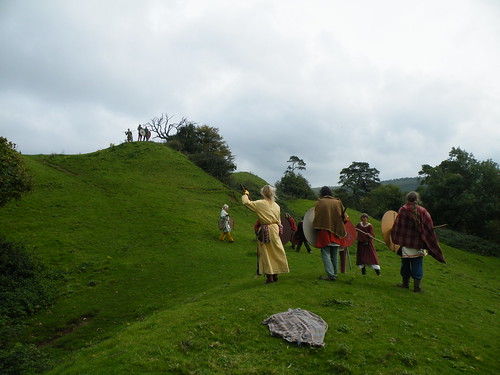The Vikings, laden down by loot from Medhamstead Abbey and fleeing the forces of Wessex, pushed into East Anglia to meet up with King Guthrum’s forces who were busy putting down the uprisings there. However, they found themselves slowed by their riches, harried by Englisc and also by those Vikings without treasure. In the ensuing clashes much treasure changed hands, including the Oestvikingae loosing the holy sheep’s shoulder blade which they stole from Cadbury.

One particularly mighty piece of loot was the Chalice of St. Botolph (an East Anglian abbot and saint of great repute). This chalice was said to have worked many miracles in the hands of the Englisc, turning aside sword-blows to save its bearer. It changed hands many times this day. The Westmen lost it to the lone wandering scop Cynric of the Sumersaete. Shortly afterwards, the marauding Oestvikingae sprung upon him and wrestled it from his grasp, and they then took their axes to it and chopped it to a more manageable size. They then tried to hide the majority of it, but they kept being disturbed by the Cilternsaete and Holmbyggjar. The Holmbyggjar soon cut down Hauk, stole most of the Chalice, and fled far to the East pursued by Thorhelm, leaving everyone else looking for them in vain.

In the evening, the local Englisc hosted a feast for the Vikings, under the rules of King Ceolwulf of Mercia. Much eating and drinking followed, including toasts to numerous Gods and Saints. There was a lot of talk of current affairs: of King Ceolwulf’s rule, of King Harald Fairhair’s raids on the Islands, of how the gathered company would act if they were a King. There were also many songs, from rousing and bawdy sing-alongs to the scop Cynric performing hauntingly beautiful tunes.
There was also much talk of the Chalice of St. Botolph. There was speculation that it might be cursed, so many times had it changed hands that day: that any who held it would lose their fights, and not hold it for long. Thus the Holmbyggjar divided its pieces up, between the Oestvikingae and the Westmen. The Oestvikingae and the Westmen then challenged Cynric to an arm wrestle for control of it, and he confidently and consecutively defeated five men to gain control of the entire Chalice and restore it. However, then the curse of the Chalice struck, and he was defeated at the hands of Hallgerd, who in turn was rapidly defeated by Guthwald. After that demonstration and confirmation of the terrible curse, none challenged Guthwald, as none wished to bear such an unlucky relic…



